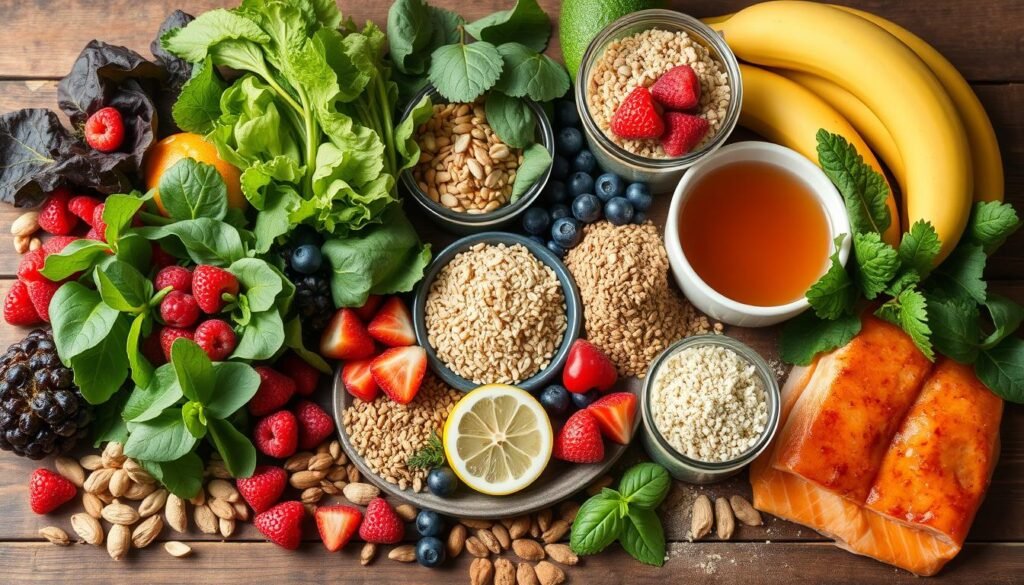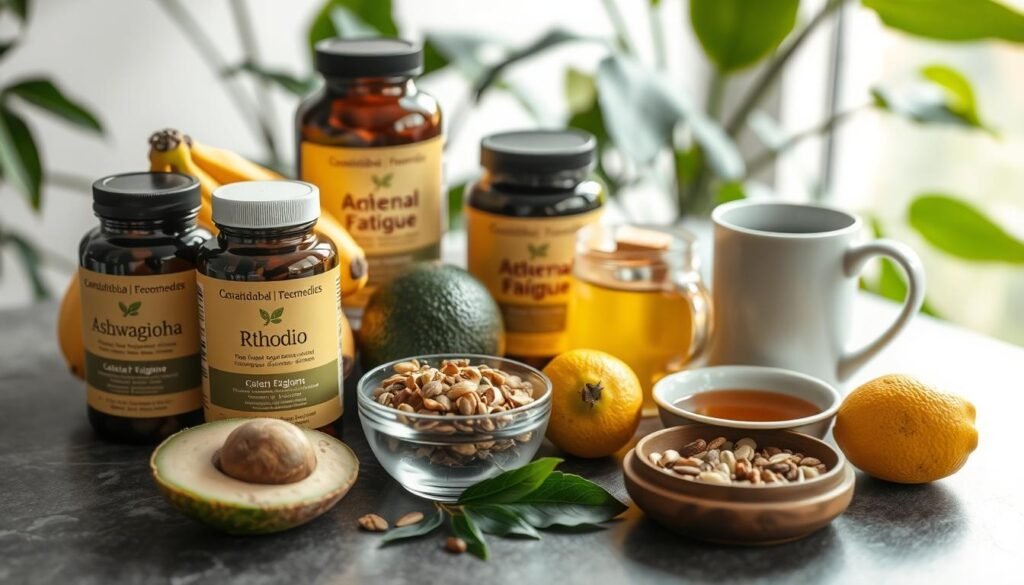Many people talk about feeling weak, which they think is due to adrenal fatigue. But, doctors and experts often don’t agree that it’s a real condition. The Endocrine Society says there’s no solid proof that adrenal fatigue is a medical issue. Still, a lot of people feel tired and weak, which looks a lot like another real condition called adrenal insufficiency. This has led to more folks looking into how changing what they eat might help.
Even if experts don’t fully recognize adrenal fatigue, figuring out how to deal with it is important for those who feel its effects. The food you eat plays a big role in managing these feelings. By eating balanced meals and drinking plenty of water, you can help keep your body strong and improve how you feel overall.
If you want to learn how changing your diet can support your adrenal health, check out this link about natural remedies for adrenal fatigue. It talks about how eating right is just one part of getting better. Changing your lifestyle and maybe taking supplements are also big steps towards feeling more energetic.
Key Takeaways
- The concept of adrenal fatigue lacks acceptance in the medical field.
- Dietary changes can play a significant role in managing fatigue-related symptoms.
- Balancing blood sugar levels is essential for adrenal health.
- Nutrition for adrenal fatigue includes a focus on whole foods and adequate hydration.
- Consulting a healthcare professional is vital for those experiencing severe symptoms.
- The adrenal fatigue diet emphasizes proteins, healthy fats, and vegetables.
Understanding Adrenal Fatigue
The adrenal glands sit above our kidneys. They are vital in controlling hormones like cortisol, which helps with stress. When people face too much stress for too long, these glands struggle. This problem leads to less cortisol being made. Although many think this drop happens because our bodies can’t keep up with stress, not all doctors agree this condition is real.
Knowing the difference between adrenal fatigue and adrenal insufficiency is key. Adrenal insufficiency is a real health issue with clear symptoms. These include feeling very tired, not wanting to eat, having stomach pain, and muscle weakness. But adrenal fatigue shows differently. People with it feel super tired in the morning, have low energy, and crave salty or sweet snacks. It’s important for folks who care about their adrenal health to understand these differences.
Eating right can help people feel better if they think they have adrenal fatigue. Lean proteins, good fats, and complex carbs are great for the adrenal glands. A balanced diet can lessen many symptoms and boost well-being. If stress is a big problem, focusing on nutritious foods and drinking plenty of water is crucial. Making these diet changes can really improve someone’s life.
Starting with good nutrition and learning about adrenal fatigue is the first step to getting healthier. This basic info helps people learn how diet can help fix and support their adrenal glands. This knowledge is the beginning of a journey towards better health.
Symptoms of Adrenal Fatigue
Learning about adrenal fatigue helps us understand our health better. This condition shows through constant tiredness and trouble sleeping. People with it crave salty and sweet snacks and tend to gain weight.
They feel overwhelmed and rely on coffee or similar boosts. The signs of adrenal fatigue can be like other health problems. Stress, bad eating habits, and not enough sleep all play a part. Even though doctors don’t all agree on adrenal fatigue, it shows how stress affects us.
Sometimes, these symptoms can look like a more serious issue called adrenal insufficiency or Addison’s disease. It comes with very bad fatigue, aches, and more. Addison’s is known well by doctors and needs special tests and treatments.
If you’re dealing with these symptoms, talk to a health expert. It’s crucial to get checked out to receive the right help. For more on this, check out WebMD.
Dietary Recommendations for Adrenal Fatigue
Eating right is key for those with adrenal fatigue. To feel better, add foods to your diet that are full of nutrients. These should include lean proteins, healthy carbs, and good fats.
Lean Sources of Protein
Protein helps keep hormones in check and supports adrenal health. Good choices are:
- Organic chicken
- Turkey
- Wild fish like salmon, full of omega-3
- Legumes such as lentils and chickpeas
Adding lean protein to your meals is smart. It provides the essential parts for making hormones.
Healthy Carbohydrates
Selecting the right carbs helps keep your blood sugar steady. Choose whole grains, brown rice, and lots of veggies. These options support stable energy. Steer clear of processed grains to avoid blood sugar spikes and tiredness. Picking healthy carbs is a great move for your diet.
Essential Fats
Fats are important for hormone regulation. Including avocados, olive oil, and nuts gives your body vital fatty acids. These fats can reduce inflammation and help your body absorb nutrients better.
To sum up, a well-rounded diet is powerful for those with adrenal fatigue. Following these tips can boost your energy and hormone balance. It’s a strong step towards healing. For more details on the best diet, check out additional resources.
Foods to Eat for Adrenal Fatigue
If you’re dealing with adrenal fatigue, choosing the right foods is key. Foods rich in essential nutrients support your adrenal function and keep your energy stable. An effective adrenal health diet should include diverse veggies, proteins, and healthy fats.
Vegetables Rich in Vitamins and Minerals
Eating a wide variety of vegetables is crucial. They give you the vitamins and minerals your body needs to heal. Leafy greens like spinach and kale keep your body functions smooth. Broccoli and other cruciferous veggies help with detox, aiding recovery. Beans and lentils are great for keeping your blood sugar steady, which is vital.
Quality Protein Sources
Choosing the right proteins helps with adrenal fatigue recovery. Lean meats and organic eggs provide the necessary amino acids for body repair. Grass-fed meats are better because they don’t have hormones or antibiotics. Legumes and fatty fish are also great choices. They offer both protein and important omega-3 fatty acids.
Healthy Fat Options
Adding healthy fats to your diet supports hormone production and energy levels. Avocados, nuts, and oils like olive and coconut are excellent. They’re packed with nutrients that improve your diet’s quality. Eating fermented foods like sauerkraut supports your gut health, aiding in adrenal recovery.

| Food Category | Examples | Benefits |
|---|---|---|
| Vegetables | Leafy greens, Cruciferous | Rich in vitamins and assist in detox |
| Protein Sources | Grass-fed meats, Fish, Eggs | Essential amino acids for repair |
| Healthy Fats | Avocados, Nuts, Olive Oil | Support hormone production and stable energy |
Foods to Avoid for Better Adrenal Health
Knowing what foods to avoid can really help if you’re dealing with adrenal fatigue. An adrenal fatigue diet means not eating certain things that make the adrenal glands work too hard. This includes foods that cause inflammation. Let’s see what to skip.
High Sugar and Processed Foods
Eating too much sugar can make your blood sugar levels jump up and down. This isn’t good for your adrenal health. You should eat less candy, baked goods, and sugary drinks. Processed foods are also bad. They’re full of refined carbs and sugars. Avoiding these helps keep your energy more stable and lowers stress on your adrenal glands.
Stimulants and Inflammatory Oils
Drinking caffeinated coffee can make adrenal fatigue symptoms worse. You might feel more anxious and less energetic. Also, inflammatory oils in processed foods hurt your gut. This is bad for your adrenal health. Try drinking green tea or yerba mate instead. They’re better for you and give you a gentle energy lift.
Gluten and Artificial Additives
People with adrenal fatigue might also react badly to gluten. It can upset your stomach and stress your adrenal glands more. It’s smarter to eat grains like quinoa or brown rice. Also, stay away from artificial additives in packaged foods. They’re not good for you. Watching out for and cutting out foods that you’re sensitive to helps make an adrenal fatigue diet work better.
| Food Category | Examples | Reasons to Avoid |
|---|---|---|
| High Sugar | Candy, Soda, Pastries | Leads to blood sugar spikes, stresses adrenal glands |
| Processed Foods | Ready Meals, Snack Foods | Often high in refined sugars and unhealthy fats, inflammatory |
| Stimulants | Coffee, Energy Drinks | Can cause increased anxiety and further deplete adrenal energy |
| Gluten | Wheat, Barley, Rye | May cause digestive issues and increase inflammation |
| Artificial Additives | Preservatives, Food Colorings | Linked to various health issues; can disrupt hormonal balance |
Meal Timing and Its Importance
Knowing when to eat is key for better energy and health, especially for adrenal fatigue. Eating at regular times keeps blood sugar stable. This helps reduce stress on the adrenal glands. We’ll talk about when to eat and what makes a balanced meal for adrenal health.
Regular Eating Intervals
Having meals and snacks at the same times each day helps your metabolism. Start with a good breakfast after you wake up. It sets the mood for a day of stable energy. Eat small meals or snacks every 3-4 hours to keep your energy up and avoid tiredness. Include protein, healthy fats, and carbs in every meal for extra benefits.
Creating a Balanced Plate
Your meals should have a smart mix of nutrients. Here’s a quick guide:
| Food Group | Percentage |
|---|---|
| Vegetables, Fruits, Whole Grains | 30-40% |
| Lean Protein | 20-30% |
| Healthy Fats | 20-30% |
This mix is key for energy and getting the nutrients you need. Using meal timing strategies that fit your day can help your adrenal health. Don’t forget to drink lots of water. It clears out toxins and keeps hormonal balance in check. This supports your body’s natural rhythms.
Hydration and Its Role in Adrenal Health
Hydration is key for adrenal health, especially if you have adrenal fatigue. When dehydrated, your stress levels go up and cortisol production can be off. It’s crucial to drink enough fluids to help your body work right.
People with adrenal fatigue often pee a lot because of low aldosterone levels. This makes them lose important minerals and crave salty foods. They might need extra salt. Starting with ¼ teaspoon of salt in 8 ounces of water can help figure out how much salt they need. Those eating whole foods often need more salt for their health.
Stress can use up nutrients fast, underscoring hydration’s role for those with adrenal fatigue. Drinking plenty of quality water and getting enough electrolytes matters. Foods like fruits and veggies also help keep you hydrated.
IV hydration therapy quickly helps people with adrenal fatigue by getting fluids and nutrients into the blood. This treatment boosts nutrient absorption and can help with energy, brain function, and the immune system. It’s efficient because it skips the digestive system.
It’s important for those worried about adrenal health to focus on staying hydrated. Drinking lots of fluids and eating water-rich foods are good steps. IV hydration therapy can provide extra help. Keeping hydrated is crucial for tackling adrenal fatigue. For more on adrenal health and antioxidant-rich diets, visit this resource.
Adrenal Fatigue Supplements and Natural Remedies
Many people look into adrenal fatigue supplements and natural remedies to improve their health. These methods aim to boost recovery and enhance well-being using nature and nutrition.
Popular Supplements for Recovery
Adaptogens, like Ashwagandha and rhodiola, are sought after for their stress management benefits. They support adrenal function and help reduce fatigue. With regular use, these supplements can improve energy levels and bring balance.
Natural Herbs and Remedies
Natural treatments for adrenal fatigue include various herbs. Drinking chamomile and rooibos herbal teas can help decrease anxiety and stress symptoms. These teas offer comfort and have soothing effects for those with adrenal fatigue.
Magnesium-rich foods, like leafy greens, nuts, and seeds, help the brain talk to the adrenal glands. This supports recovery even more.
| Supplement/Herb | Benefits |
|---|---|
| Ashwagandha | Supports adrenal function and reduces fatigue |
| Rhodiola | Enhances stamina and decreases stress levels |
| Chamomile | Promotes relaxation and reduces anxiety |
| Rooibos | Alleviates stress symptoms and aids in sleep |
| Leafy Greens | Rich in magnesium, supports brain-adrenal communication |

The Role of Lifestyle Changes in Recovery
Making specific lifestyle changes can deeply impact recovery from adrenal fatigue. These changes include eating habits, managing stress, and focusing on rest. They are key to improving sleep, exercise, and handling stress, which boosts overall health.
Stress Management Techniques
Managing stress is crucial in recovering from adrenal fatigue. Since chronic stress leads to adrenal fatigue, it’s important to manage it well. Activities like mindfulness or quick exercises can lower stress. Here are some tips:
- Do at least ten minutes of stress-relief activities every day.
- Make time for relaxation practices like yoga or meditation.
- Work on identifying and reducing stress causes in your life.
- Eat regularly, every 2-3 hours, to keep your blood sugar stable and support your adrenal glands.
Importance of Sleep and Rest
Getting enough quality sleep is essential for adrenal health. Most adults need 7-8 hours, but those with adrenal fatigue might need more. To sleep better, follow these strategies:
- Have a small, protein and fat-rich snack before bed.
- Stick to a regular sleep schedule to help your circadian rhythm.
- Avoid foods high in industrial seed oils that can inflame and affect adrenal health.
Vitamins C and D are vital for adrenal health, especially when stressed. Including omega-3s and B vitamins in your diet also helps support your adrenals.
| Activity | Benefit |
|---|---|
| Meditation | Reduces stress, boosts mood |
| Regular Exercise | Improves energy, regulates hormones |
| Consistent Sleep Schedule | Enhances sleep quality, supports adrenal function |
| Balanced Nutrition | Stabilizes blood sugar, promotes overall health |
Understanding how sleep, diet, and stress are connected offers a full view of recovery. It helps in healing adrenal fatigue and supports the body’s natural healing processes.
Consulting with Healthcare Professionals
If you’re feeling tired all the time, you may have adrenal fatigue. It’s important to talk to doctors who understand this condition. They can give you personalized advice and treatments. Working together helps find what causes your fatigue and meets your nutrition needs.
Doctors can run tests to measure cortisol levels and other important markers. These tests help them suggest dietary and lifestyle changes. This plan can improve your recovery process and overall wellness.
Before changing your diet or taking new supplements, always ask a healthcare expert. Many supplements, like B vitamins and magnesium, promise to help adrenal health. Although some studies show they can help, experts know best. They can recommend what’s right for your health.
The table below shows some common supplements and their possible benefits. But remember, it’s crucial to have an expert’s advice:
| Supplement | Potential Benefits |
|---|---|
| Ginseng | May reduce fatigue in healthy individuals. |
| Ashwagandha | Could decrease cortisol and alleviate stress, anxiety, and depression. |
| Rhodiola Rosea | May lower anxiety and stress levels. |
| Magnesium | Influences HPA axis function, can reduce cortisol release. |
| B Vitamins | Essential for mood balance and neurotransmitter production. |
Talking regularly with healthcare experts about adrenal fatigue is key. They offer the best advice for your specific situation. This team approach helps manage health better, focusing on diet and lifestyle changes for long-term wellness.

Conclusion
Adrenal fatigue hits a big part of adults in the United States. In fact, nearly 80% face adrenal issues during their lives. It’s key to know the best diet to manage this problem. Eating foods rich in nutrients, like leafy greens and quality protein from tuna, is critical. Healthy fats, such as those from olive oil and omega-3s, also support your adrenal glands.
Lifestyle changes are just as important for dealing with adrenal fatigue. This includes managing stress, sleeping well, and staying hydrated. Cutting down on caffeine, sugar, and processed foods can ease symptoms like tiredness and weight changes. It’s also important to work with healthcare professionals. They can watch your symptoms and suggest the best treatments.
Making these changes can greatly improve your well-being and energy levels. Better adrenal health comes from combining good nutrition, enough water, stress control, and changes in your lifestyle. By following these steps, you can live a healthier and more vibrant life.